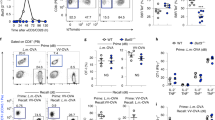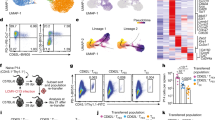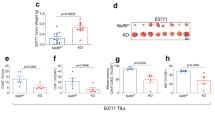Abstract
Foxo transcription factors regulate cell cycle progression, cell survival and DNA-repair pathways. Here we demonstrate that deficiency in Foxo3 resulted in greater expansion of T cell populations after viral infection. This exaggerated expansion was not T cell intrinsic. Instead, it was caused by the enhanced capacity of Foxo3-deficient dendritic cells to sustain T cell viability by producing more interleukin 6. Stimulation of dendritic cells mediated by the coinhibitory molecule CTLA-4 induced nuclear localization of Foxo3, which in turn inhibited the production of interleukin 6 and tumor necrosis factor. Thus, Foxo3 acts to constrain the production of key inflammatory cytokines by dendritic cells and to control T cell survival.
This is a preview of subscription content, access via your institution
Access options
Subscribe to this journal
Receive 12 print issues and online access
$209.00 per year
only $17.42 per issue
Buy this article
- Purchase on Springer Link
- Instant access to full article PDF
Prices may be subject to local taxes which are calculated during checkout







Similar content being viewed by others
References
Calnan, D.R. & Brunet, A. The FoxO code. Oncogene 27, 2276–2288 (2008).
Galili, N. et al. Fusion of a fork head domain gene to PAX3 in the solid tumour alveolar rhabdomyosarcoma. Nat. Genet. 5, 230–235 (1993).
Hillion, J., Le Coniat, M., Jonveaux, P., Berger, R. & Bernard, O.A. AF6q21, a novel partner of the MLL gene in t(6;11)(q21;q23), defines a forkhead transcriptional factor subfamily. Blood 90, 3714–3719 (1997).
Corral, J. et al. Acute leukemias of different lineages have similar MLL gene fusions encoding related chimeric proteins resulting from chromosomal translocation. Proc. Natl. Acad. Sci. USA 90, 8538–8542 (1993).
Jacobs, F.M. et al. FoxO6, a novel member of the FoxO class of transcription factors with distinct shuttling dynamics. J. Biol. Chem. 278, 35959–35967 (2003).
Barthel, A., Schmoll, D. & Unterman, T.G. FoxO proteins in insulin action and metabolism. Trends Endocrinol. Metab. 16, 183–189 (2005).
Biggs, W.H. III, Meisenhelder, J., Hunter, T., Cavenee, W.K. & Arden, K. C. Protein kinase B/Akt-mediated phosphorylation promotes nuclear exclusion of the winged helix transcription factor FKHR1. Proc. Natl. Acad. Sci. USA 96, 7421–7426 (1999).
Brunet, A. et al. Akt promotes cell survival by phosphorylating and inhibiting a Forkhead transcription factor. Cell 96, 857–868 (1999).
Kops, G.J. et al. Direct control of the Forkhead transcription factor AFX by protein kinase B. Nature 398, 630–634 (1999).
van der Horst, A. & Burgering, B.M. Stressing the role of FoxO proteins in lifespan and disease. Nat. Rev. Mol. Cell Biol. 8, 440–450 (2007).
Brunet, A. et al. Stress-dependent regulation of FOXO transcription factors by the SIRT1 deacetylase. Science 303, 2011–2015 (2004).
Motta, M.C. et al. Mammalian SIRT1 represses forkhead transcription factors. Cell 116, 551–563 (2004).
Stahl, M. et al. The forkhead transcription factor FoxO regulates transcription of p27Kip1 and Bim in response to IL-2. J. Immunol. 168, 5024–5031 (2002).
Dijkers, P.F. et al. Forkhead transcription factor FKHR-L1 modulates cytokine-dependent transcriptional regulation of p27KIP1. Mol. Cell. Biol. 20, 9138–9148 (2000).
Barata, J.T. et al. Activation of PI3K is indispensable for interleukin 7-mediated viability, proliferation, glucose use, and growth of T cell acute lymphoblastic leukemia cells. J. Exp. Med. 200, 659–669 (2004).
Kerdiles, Y.M. et al. Foxo1 links homing and survival of naive T cells by regulating L-selectin, CCR7 and interleukin 7 receptor. Nat. Immunol. 10, 176–184 (2009).
Peng, S.L. Foxo in the immune system. Oncogene 27, 2337–2344 (2008).
You, H. et al. FOXO3a-dependent regulation of Puma in response to cytokine/growth factor withdrawal. J. Exp. Med. 203, 1657–1663 (2006).
Riou, C. et al. Convergence of TCR and cytokine signaling leads to FOXO3a phosphorylation and drives the survival of CD4+ central memory T cells. J. Exp. Med. 204, 79–91 (2007).
Lin, L., Hron, J.D. & Peng, S.L. Regulation of NF-κB, Th activation, and autoinflammation by the forkhead transcription factor Foxo3a. Immunity 21, 203–213 (2004).
Orabona, C. et al. CD28 induces immunostimulatory signals in dendritic cells via CD80 and CD86. Nat. Immunol. 5, 1134–1142 (2004).
Mellor, A.L. & Munn, D.H. IDO expression by dendritic cells: tolerance and tryptophan catabolism. Nat. Rev. Immunol. 4, 762–774 (2004).
Hosaka, T. et al. Disruption of forkhead transcription factor (FOXO) family members in mice reveals their functional diversification. Proc. Natl. Acad. Sci. USA 101, 2975–2980 (2004).
Marinkovic, D. et al. Foxo3 is required for the regulation of oxidative stress in erythropoiesis. J. Clin. Invest. 117, 2133–2144 (2007).
Greer, E.L. & Brunet, A. FOXO transcription factors at the interface between longevity and tumor suppression. Oncogene 24, 7410–7425 (2005).
Castrillon, D.H., Miao, L., Kollipara, R., Horner, J.W. & DePinho, R.A. Suppression of ovarian follicle activation in mice by the transcription factor Foxo3a. Science 301, 215–218 (2003).
Villadangos, J.A. & Schnorrer, P. Intrinsic and cooperative antigen-presenting functions of dendritic-cell subsets in vivo. Nat. Rev. Immunol. 7, 543–555 (2007).
Oldstone, M.B. Biology and pathogenesis of lymphocytic choriomeningitis virus infection. Curr. Top. Microbiol. Immunol. 263, 83–117 (2002).
Rosas, M. et al. IL-5-mediated eosinophil survival requires inhibition of GSK-3 and correlates with β-catenin relocalization. J. Leukoc. Biol. 80, 186–195 (2006).
Korn, T., Bettelli, E., Oukka, M. & Kuchroo, V.K. IL-17 and Th17 cells. Annu. Rev. Immunol. 27, 485–517 (2009).
Rochman, I., Paul, W.E. & Ben-Sasson, S.Z. IL-6 increases primed cell expansion and survival. J. Immunol. 174, 4761–4767 (2005).
Fallarino, F. et al. CTLA-4-Ig activates forkhead transcription factors and protects dendritic cells from oxidative stress in nonobese diabetic mice. J. Exp. Med. 200, 1051–1062 (2004).
Leach, D.R., Krummel, M.F. & Allison, J.P. Enhancement of antitumor immunity by CTLA-4 blockade. Science 271, 1734–1736 (1996).
Karandikar, N.J., Vanderlugt, C.L., Walunas, T.L., Miller, S.D. & Bluestone, J.A. CTLA-4: a negative regulator of autoimmune disease. J. Exp. Med. 184, 783–788 (1996).
Zang, X. & Allison, J.P. The B7 family and cancer therapy: costimulation and coinhibition. Clin. Cancer Res. 13, 5271–5279 (2007).
Botto, M. et al. Homozygous C1q deficiency causes glomerulonephritis associated with multiple apoptotic bodies. Nat. Genet. 19, 56–59 (1998).
Bickerstaff, M.C. et al. Serum amyloid P component controls chromatin degradation and prevents antinuclear autoimmunity. Nat. Med. 5, 694–697 (1999).
Santiago-Raber, M.L. et al. Role of cyclin kinase inhibitor p21 in systemic autoimmunity. J. Immunol. 167, 4067–4074 (2001).
Kishimoto, T. Interleukin-6: from basic science to medicine–40 years in immunology. Annu. Rev. Immunol. 23, 1–21 (2005).
Teague, T.K., Marrack, P., Kappler, J.W. & Vella, A.T. IL-6 rescues resting mouse T cells from apoptosis. J. Immunol. 158, 5791–5796 (1997).
Keir, M.E. & Sharpe, A.H. The B7/CD28 costimulatory family in autoimmunity. Immunol. Rev. 204, 128–143 (2005).
Wing, K. et al. CTLA-4 control over Foxp3+ regulatory T cell function. Science 322, 271–275 (2008).
Grohmann, U. et al. CTLA-4-Ig regulates tryptophan catabolism in vivo. Nat. Immunol. 3, 1097–1101 (2002).
Hara, T. et al. High-affinity uptake of kynurenine and nitric oxide-mediated inhibition of indoleamine 2,3-dioxygenase in bone marrow-derived myeloid dendritic cells. Immunol. Lett. 116, 95–102 (2008).
van Stipdonk, M.J., Lemmens, E.E. & Schoenberger, S.P. Naive CTLs require a single brief period of antigenic stimulation for clonal expansion and differentiation. Nat. Immunol. 2, 423–429 (2001).
Acknowledgements
We thank J.P. Allison (Sloan-Kettering Memorial Hospital) and J.A. Bluestone (University of California at San Diego) for CTLA-4-specific blocking antibodies; A. Brunet (Stanford University) for Foxo3-specific antibody; L. Lefrançois (University of Connecticut Health Center) for OVA-expressing vesicular stomatitis virus; L. Mack and E. Zuniga for assistance with virus titers; and M. Niwa for microscope facility use. Supported by the American Cancer Society (R.A.D.), the Robert A. and Renee E. Belfer Institute for Innovative Cancer Research (R.A.D.), the US National Cancer Institute (R.A.D.), the Division of Biological Sciences of the University of California, San Diego (S.M.H.) and the Fondation pour la Recherche Médicale (A.S.D.).
Author information
Authors and Affiliations
Contributions
D.R.B. initiated the project and did lymphocyte characterization and LCMV infection under the supervision of S.M.H.; A.S.D. designed and did the remaining experiments in collaboration with D.R.B., I.L.C., Y.M.K. and S.M.H.; A.B. provided expertise in fluorescence microscopy analysis; R.A.D. and D.H.C. produced Foxo3−/− mice and provided intellectual input on the data; K.C.A. provided Foxo3Kca mice; S.M.H. initiated the project with input from R.A.D. and K.C.A. and supervised the experiments; and A.S.D. and S.M.H. wrote the manuscript with editorial and intellectual contributions from the other authors.
Corresponding author
Supplementary information
Supplementary Text and Figures
Supplementary Figures 1–6 (PDF 5596 kb)
Rights and permissions
About this article
Cite this article
Dejean, A., Beisner, D., Ch'en, I. et al. Transcription factor Foxo3 controls the magnitude of T cell immune responses by modulating the function of dendritic cells. Nat Immunol 10, 504–513 (2009). https://doi.org/10.1038/ni.1729
Received:
Accepted:
Published:
Issue Date:
DOI: https://doi.org/10.1038/ni.1729
This article is cited by
-
Proteome-wide Mendelian randomization reveals the causal effects of immune-related plasma proteins on psychiatric disorders
Human Genetics (2023)
-
Metformin induces tolerogenicity of dendritic cells by promoting metabolic reprogramming
Cellular and Molecular Life Sciences (2023)
-
Foxo3a tempers excessive glutaminolysis in activated T cells to prevent fatal gut inflammation in the murine IL-10−/− model of colitis
Cell Death & Differentiation (2022)
-
Potential role for EZH2 in promotion of asthma through suppression of miR-34b transcription by inhibition of FOXO3
Laboratory Investigation (2021)
-
No Association Between a Genetic Variant of FOXO3 and Risk of Type 2 Diabetes Mellitus in the Elderly Population of North India
Indian Journal of Clinical Biochemistry (2021)



